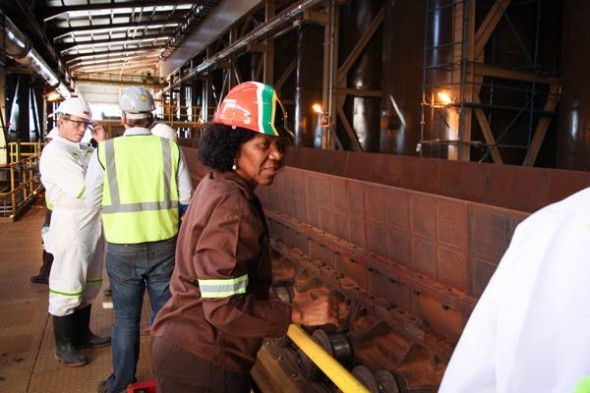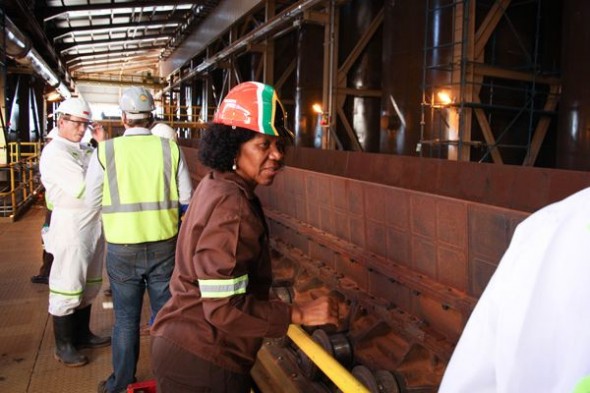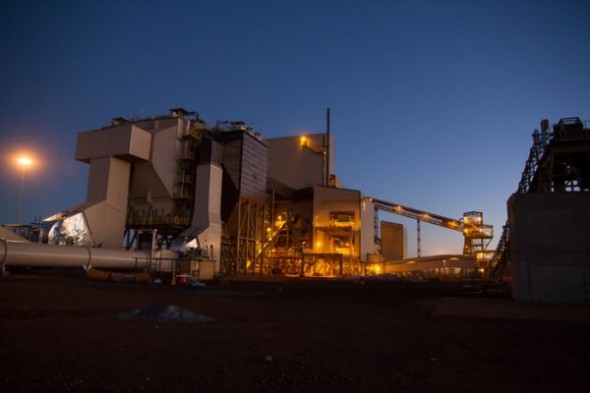
Iron Lady of manganese takes on mining’s big boys
Daphne Mashile-Nkosi is the owner of a multimillion-rand manganese mine in the arid Northern Cape town of Hotazel and one of a handful of women in South Africa’s mining industry. Battle-hardened by her experiences in the struggle against apartheid, she’s not afraid to tackle those who stand in her way. Hotazel, as its name […]

Daphne Mashile-Nkosi is the owner of a multimillion-rand manganese mine in the arid Northern Cape town of Hotazel and one of a handful of women in South Africa’s mining industry. Battle-hardened by her experiences in the struggle against apartheid, she’s not afraid to tackle those who stand in her way.

Hotazel, as its name suggests, lies on an arid savannah in the Kalahari region of the Northern Cape, the scorching sun beating the dusty plains. Dominating the town’s landscape is a massive, nondescript plant: the Kalagadi Manganese Mine, said to be the largest in the world, but also one of the most eco-friendly. Standing on the top floor of the site’s seven-story sintering plants, which processes the manganese ore, the mine’s owner Daphne Mashile-Nkosi, known as the iron lady, looks out over the arid landscape. She recalls the time she and her now late husband, Stanley Nqobizizwe Nkosi, got the land.
“Before we built the mine, this was a game farm,” she said. “When my husband and I approached it, there was a locked gate. The farmers wanted to put the dogs on us.”
The Nkosis eventually received their licence to prospect for manganese in the Kalahari Basin in 2005 and started what is now a R7-billion venture. Mashile-Nkosi is the chief executive and founder of Kalahari Resources, the holding company for the Kalagadi Manganese Mine in Hotazel.
For well over a century South African mining has been dominated by white men, so it is rare to find a black woman among the major players in the industry. “The mining industry has not been an easy road, especially for a black woman,” Mashile-Nkosi said at the 2014 African CEO Forum in Geneva, Switzerland, where she was named CEO of the Year. “I have persevered and succeeded in surmounting the many obstacles that have been placed in my path. Where there is no pain, there is no gain.”
But Mashile-Nkosi is not all business. She is also involved in women’s rights and upliftment, and environmental sustainability. She is a trustee and the chairperson of the Women’s Development Bank Trust and chairs the Women’s Development Bank Investments Holdings. At her speech in Geneva, she counted these as her successes, part of the work that earned her the award. That award, she said, “also acknowledges that an African woman can make her mark in the historically male-dominated mining industry.”

The making of a woman miner
In 2001, Mashile-Nkosi and her husband established Kalahari Resources with the intention of mining manganese on the game farm. The opportunity arose from new mining legislation designed to bring historically disadvantaged individuals, especially women, into the industry.
The mine has brought some relief to an impoverished part of South Africa, creating up to 3 000 jobs in the Northern Cape. And it looks after the people in those jobs: Kalagadi has on-site accommodation and state-of-the-art ablution facilities. According to Mashile-Nkosi, the mine first completed a prefeasibility study through JSE-listed construction firm Group Five to determine the housing needs of its workers.
In an interview with Leadership magazine, Mashile-Nkosi said women employees at Kalagadi are treated as equals to men, and often have high-level responsibilities. “We have ensured that women are given meaningful and critical roles at Kalagadi Manganese – especially in the fields of finance, geology and engineering.”
Kalagadi has an estimated 960-million metric tons of manganese as deep as 340 metres underground. The plant’s advanced mining and processing machinery allows it to produce as much as 2.4-million tons of manganese per year. Mashile-Nkosi said the life of the mine could be more than 300 years.
The mine unearths some 3-million tons of ungraded ore a year, 38% of which is made up of manganese. The sintering plant then processes ore and dust into a high-grade agglomeration known as sinter, 47% of which is manganese, which is then ready for the smelter.
Resilience born from the struggle
Born in Pilgrim’s Rest in Mpumalanga, Mashile-Nkosi grew up in a poor household that included two brothers and a sister. After completing her schooling in 1976, she became a committed anti-apartheid activist. Her experience of the struggle cemented her determination to develop black communities and women to this day.
She was a founding member of the Detainees Parents’ Support Committee, which in the 1970s and 1980s gave moral and material support to families of detainees and political prisoners. She was also involved in the formation of the United Democratic Front in 1983, chaired the Soweto sub-region of the ANC Women’s League, and was later the general-secretary of the Soweto branch of the South African Communist Party.
In 2008 Mashile-Nkosi’s battle-hardened attitude served her well, when her husband died. He went to Charlotte Maxeke Hospital in Johannesburg to treat a pinched nerve in the neck. But according to reports, poor nursing and a botched throat operation left him choking to death. She worked through the trauma well enough to take on the mining business on her own and turn it into a multibillion-rand venture.
Her steely personality came to the fore again during a dispute with Kalagadi’s major shareholder ArcelorMittal. The steelmaker had not fulfilled its funding obligations. Kalahari Resources took them to the South Gauteng High Court and won the case, forcing the steel giants to pay R285-million within five days.
In that time, Mashile-Nkosi did not succumb to the pressure of the court battle, and thanks her resilience. This trait, she told DestinyConnect.com, are the qualities of a leader. “She rates resilience, self-motivation, tenacity, courageousness, vision and patience as her strengths,” said the writer.
By:Shamin Chibba
Source: Media Club South Africa
